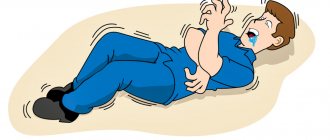Fear of going crazy is a neurosis. Where does the fear of going crazy come from in people with neurosis (VSD)?
Vegetative-vascular dystonia is not a disease at all, but a mental disorder.
Against this background, the entire neuro-vegetative system breaks down and the person receives a huge number of physical symptoms (psychosomatics), accompanied by panic attacks and constant anxiety. An anxious mind gives rise to an endless stream of equally anxious thoughts, fears, and phobias. The interesting thing is that if a fighter thinks for a long time about the fear of going crazy, he may well cause a panic attack with these thoughts. Exactly the same as the other way around – an attack gives rise to thoughts of fear of “going crazy.” Such a vicious and endless circle.
A panic attack itself, no matter how it manifests itself, is a very disgusting, painful and difficult to control condition. There are so many symptoms, and they can be so varied, that you may think one day you won’t be able to cope with it all, you will simply not be able to stand it and “go crazy.” In this state, many are afraid of harming themselves, loved ones, and even accidentally committing suicide.
The fact that most people go the wrong way and begin to treat the symptoms of neurosis (VSD), and not its causes, results in few results. A person does not leave doctors’ offices, swallows pills, goes to MRI 3 times a week, but there is no improvement. You can find out which doctor you should see first here. Panic attacks continue, physical condition worsens, moral strength dries up. Here, anyone will probably think about the possibility of going crazy - after all, living like this is simply unbearable. It is also frightening that most people simply do not understand what is happening to them and why they feel so bad.
You should not be afraid of the very thoughts of madness; they are quite justified in such a state, and appear in many people suffering from neurosis. The question is, is it really possible to lose your sanity due to VSD? More on this below, but now a small piece of information to reassure you that similar phobias also occur in healthy people.
Why do people go crazy?
A person goes crazy due to nervousness. Severe psychological shock leads to serious negative consequences. Many people cannot stand it and commit suicide. Others begin to kill, attack the defenseless, rob, and so on. You don’t have to spend too much time looking for examples. My dad told me how young guys from the army where he served shot themselves when they found out that their girlfriends had married others. Many people, after an endless series of failures, start, and as a result go crazy with delirium tremens. People also go crazy from loneliness, endless disappointments, and everyday dissatisfaction. Simply put, a person goes crazy because of those situations that greatly hurt him, tug at his heartstrings, and very strongly.
For example, a business collapsed. During the financial crisis, many businessmen committed suicide when they began to lose everything. A man has been building his business for years, sacrificing his time, strength, nerves, perhaps his family, and then a crisis came and took everything away. Who can stand this?
Loneliness can also make you go crazy. Can you imagine what it’s like when a person wakes up alone in an apartment every morning, with no one to talk to? Few people can stand this. A person must live in society because he was born in it. It’s Mowgli or Tarzan who can do without people, but we can’t.
The nervous psyche begins to wobble due to failures. For example, a person tried many times, but never got the desired result. Hard work destroys the human psyche, as a result of which he goes crazy. Because ours, a person begins to feel emptiness inside (internal unfilledness). This accumulates over and over again, and eventually leads to a shift in mind. The man is going crazy. And you can list such examples yourself. A person can go crazy just from boredom.
So, there are plenty of reasons to go crazy. Fortunately, many people know how to deal with them. If that weren't the case, we'd all be nuts by now. Many people can do it and it’s very good. So how can you not go crazy?
Fear of going crazy. What is the reason for the fear of going crazy with neurosis and VSD?
6422
Fear of going crazy is a fairly common phobia in neurosis and VSD. This phobia usually appears after a panic attack. When a panic attack takes you by surprise, the thought often arises in your head: what if I’m going crazy and one day I just lose control of myself? Such fear is not listed as a separate item in any classification of bodily ailments. But it is on the list of phobias and is called lissophobia.
Symptom begets symptom
All life with VSD and neurosis is a continuous vicious circle. Perpetual phobias and scary thoughts lead to panic attacks, but the attacks themselves often cause the development of new phobias. Especially if the person is extremely impressionable. During the release of adrenaline, consciousness is in an altered state, since the brain, under the influence of the fear hormone, functions in an “emergency” mode, forcing the body to produce certain reactions: tremors, tension in the gastrointestinal tract muscles, increased heart rate, panic attacks and the readiness to run headlong from danger.
Such symptoms not only frighten and upset the patient, they force him to analyze his own health and draw terrible conclusions. The fantasy of a neurotic, well-read and sophisticated person exceeds all expectations. Often a person becomes overgrown with fears and listens to every new symptom. When a hypochondriac realizes that he can’t do anything about his panic attacks, there is a persistent fear of going crazy, becoming dangerous to himself and others, doing terrible things, or even accidentally committing suicide during the next such attack.
With severe neurosis, anxieties and fears roll down like a snowball, acquiring more and more new symptoms. At first, a person is only afraid of losing control over himself, but after a while this fear develops into a persistent phobia and becomes a trigger for new fears.
What fuels the phobia of going crazy?
Of course, the fear of going crazy comes not only to those suffering from VSD, but also to “ordinary” people. However, some people tend to inflate this fear and submit to it, and some simply leave it at the door. Who does this phobia choose?
- Hypochondriacs - those who listen to every heartbeat and believe that every thought can theoretically come true (and therefore will definitely come true).
- People with panic attacks. As mentioned above, panic attacks greatly contribute to the emergence of this phobia.
- People under severe stress.
- People with OCD or GAD who cannot control their own thoughts and perform many meaningless actions under the magic of their neuroses. In this situation, fear of madness will be a secondary problem and will be eliminated with successful treatment of the underlying illness.
But can extreme stress or a panic attack really drive a person crazy?
As long as you understand this, you are healthy
A panic attack is a normal reaction of a person who has decided that he is in danger and urgently needs to run away. All the symptoms that the body endures under the influence of the fear hormone are just a caring gesture from nature, wanting us to survive. That is, in this situation, all the body’s reactions are aimed at self-preservation, and there was no madness in Mother Nature’s plans from the beginning.
For a person to go crazy, i.e. If you get schizophrenia, you need a genetic predisposition. And if you do not have schizophrenia in genetics, a panic attack is not capable of causing such profound changes in the psyche. Adrenaline does not change the structure of the brain, does not cause pathologies in it, so madness is excluded. While a neurotic is terribly afraid of his own insanity, he is not crazy. Only those who are not aware of the pathology or deny it in every possible way are truly insane.
The fear of going crazy with neurosis is actually illogical, and it also really spoils life. If you do nothing about the problem, it will become larger. It is necessary to contact an experienced psychologist and try to find out what is the source of this phobia. When the root cause is eliminated, the fear of madness will disappear. Sometimes just a few sessions of psychotherapy return a person to a normal, cheerful state, and in the future he remembers his groundless fears with a smile.
I'm afraid of going crazy - what's wrong with me?
Kantuev Oleg Ivanovich
Hello. In fact, no “VSD” exists in nature, just as it does not exist in the modern international classification of diseases ICD 10 Revision. According to the historically established tradition, in Russia we write off symptoms as “VSD” in the old fashioned way? characteristic of anxiety-neurotic disorders, and typical manifestations of the so-called “panic attack” are usually called autonomic (or sympathoadrenal) crisis. Therefore, the abbreviation “VSD”, especially among emotional people, often hides a banal anxiety neurosis that needs to be treated by a psychotherapist rather than a neurologist. There are no clear and distinct criteria for the pseudo-diagnosis of “VSD”, which does not exist at all in modern medicine. The human nervous system consists of the central nervous system and the autonomic system. The autonomic system controls the functioning of internal organs. The ANS, in turn, is divided into sympathetic and parasympathetic. Sympathetic, for example, increases blood pressure and speeds up the heart, while parasympathetic, on the contrary, lowers blood pressure and slows down the heartbeat. Normally they are in balance. Autonomic system dysfunction is an imbalance and malfunction of the body systems that regulate autonomic functions. That is, an imbalance between the sympathetic and parasympathetic systems of the autonomic nervous system. In practice, it looks something like this: a person got worried and felt pain in his heart. He consults a cardiologist complaining of pain. The doctor completely examines the person (calling him sick), does an ECG, and an ultrasound of the heart. The “patient” undergoes a lot of different tests. There are no changes anywhere. The doctor says: “Your heart is fine,” it’s VSD, go see a neurologist. The neurologist checks the reflexes and says that everything is fine on his part, suggests taking sedatives: valerian, motherwort, etc. The pain begins to go to the cardiologist, therapist, neurologist - and no one finds the disease. Everyone says that you have VSD. But this doesn’t make it any easier, and does your heart hurt? They suggest going to see a psychiatrist... And so years pass until, finally, one day, plucking up the courage, a person independently turns to a psychotherapist. The psychotherapist immediately understands that this person suffers from a classic systemic (organ) neurosis. And after the specialist begins to conduct an individual and comprehensive psychotherapeutic program (which is usually based on cognitive behavioral therapy), the pain immediately goes away. The question is, is it worth it for you to walk around with a non-existent diagnosis of “VSD”? Isn’t it easier to immediately consult a psychotherapist, and not waste any time, energy, or a lot of money today?!
Fear of going crazy with obsessive-thought neurosis. Fear of going crazy. Will I go crazy?
The fear of going crazy is a common occurrence in the world of mental illness. According to any internal scale of a person, the appearance of precisely this fear makes the psyche howl with tension. Vanity and chaos in everyday life reach extreme levels. Concentration on everyday activities tends to zero. It is extremely difficult to wait for understanding from others. Or, perhaps even worse, they begin to doubt your mental health too. With this fear, your whole life is concentrated at the tip of your thoughts, which are frantically looking for confirmation or refutation of the fact that you have already gone crazy. And since it is almost impossible to find objective criteria that in this case would allow you to calm down (you will find out why below), the fear of madness settles in a person’s head for a long time. Yes, you can try in every possible way to suppress it, crowd it out and drive it away. But he, like a cockroach, keeps coming back. Sound familiar? Then let's move on to WHAT TO DO WITH IT.
Act one. Theoretical.
What you need to know if you are faced with the fear of madness. All mental disorders are divided into three parts.
1) psychotic disorders - this is where the very “madness” that many are so afraid of belongs to. If we talk about specific diagnostic options, this includes all forms of schizophrenia. A person with such a diagnosis is someone who will face a really big psychiatry, medication and (often) inpatient treatment. An important nuance is that with such disorders there is practically no criticism of oneself and one’s condition.
2) borderline disorders - which imply that you have personality changes, difficulties in understanding yourself, strong psychological defenses that prevent you from living adequately in the world around you. A critical attitude towards oneself and one’s condition is preserved here; the main problem is the persistence of one’s disorder and low ability to influence one’s condition.
3) neurotic disorders - which are associated with psychological reasons that are reversible, although they are extremely painful and are tied to the suppression (repression, conflict) of one’s own emotions and needs. An important nuance. Your criticality is preserved, and you are able to change your condition.
So, some good news. Fear of madness is NOT characteristic of psychotic and borderline disorders. Yes, sometimes he is in these two groups. But the fear of madness itself ALREADY means maintaining a critical attitude towards oneself. Most often, fear of madness means that you have neurosis. That is, your condition, if you have a fear of madness, is highly likely to be treatable and reversible.
Act two. Practical.
Now for some bad news. If you have a fear of madness during your neurosis, this means that you:
- don’t treat your neurosis at all
— the chosen treatment strategy (drug or drugs, psychotherapist or psychotherapy strategy) is incorrect or insufficient.
That is, the presence of fear of madness is a kind of barometer for determining the quality of the treatment provided (or not provided). There is fear and it is sharp and bright - you need to CHANGE your treatment strategy.
So ask yourself the following questions right now:
1st (and most important) – am I treating my neurosis? If not, start doing it. Even if the fear of madness is unlikely to lead to some very serious consequences, but without treatment, the quality of your life can become, to put it mildly, depressing.
2nd question - does my treatment lead to positive changes in my feelings (intensity of symptoms) or objective criteria (presence/frequency of symptoms)? If not, plan a visit to your doctor or psychologist right now to correct your therapy.
3rd question – do I make efforts regularly and consistently? Do I take ALL the prescribed medications (and not just those that have few side effects or that I am not afraid of)? Do I visit my therapist or therapy group regularly (and not just when I feel like it)? If not, then maybe it’s worth starting to do it???
I would be grateful if you express your approval of this publication in the “say thank you” form below. It would also be interesting to hear constructive feedback in the comments.
You can subscribe to my articles and blog posts here
Do you want to learn how to manage your neurosis yourself?
Take an online psychocorrection course individually or in a group!
Fear of going crazy and losing control of yourself. What it is?
Ordinary people are afraid of any disease. This is a completely normal fear. Most of us feel terror at the thought of losing control of ourselves. And this is also not something out of the ordinary. The main thing is that this fear does not become permanent.
A sane person, aware of his actions and responsible for his actions, is afraid of losing his status and becoming completely helpless in terms of social adaptation. This same person may realize that the disease does not select people by status or wealth. Therefore, we all understand that anyone can lose their mind. This is where the phobia develops.
True, here we need to make a reservation: not each of us can think about this problem 24 hours a day. A very small part of people experience a truly strong fear of going crazy. The big one, with a more stable psyche, tries not to think about it.
It is not for nothing that such a disorder is not of a psychiatric nature, but more of a psychological one. That is why it is not included in the list of serious diseases established by the international community. And all because this phobia may indicate that a person has certain reasons for developing anxiety. This is how they are separated.
- Socio-cultural. They arise when a person experiences various psycho-emotional stress in his life. Professional activities associated with risks can also lead to this condition. If we add to this the dependence on other people’s opinions, then progress in terms of the development of a phobia becomes inevitable. Separately, genetic predisposition should be noted. And when a person knows that his close relative suffered from insanity, the fear of repeating the fate of the sick relative can grow and turn into panic attacks.
Personal character traits. People with increased anxiety, lack of self-confidence, and a tendency to depression and stress may experience fear of insanity.







